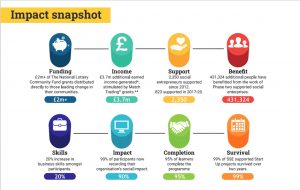Does SSE make people better social entrepreneurs?
7 Dec 2021
As a learning organisation, we’re always keen to understand and improve the impact we have on our changemakers and their social enterprises. That’s why we commissioned independent research firm ERS to evaluate our biggest support programme.*
Over 2,500 social entrepreneurs have taken part in the Lloyds Bank and Bank of Scotland Social Entrepreneurs Programme, jointly funded by The National Lottery Community Fund. It’s the largest programme of its kind in the UK (scroll down for info about the programme).
We’re incredibly proud to share key findings from the ERS report, available to download here.
We’re developing more skilled, resilient community leaders
- 99% of students report improvement in business skills, leadership, emotional resourcefulness, impact measurement and confidence.
- The greatest improvements were in business and entrepreneurial skills, and in networks and networking (20% increase on average).
We’re building more sustainable social enterprises
- 99% of projects launched at Start Up level survived 2+ years.
- Trade Up and Scale Up participants achieved £3.7m additional earned income, stimulated by our Match Trading® grants.
We’re nailing social impact
- 90% of participants are now recording their organisation’s social impact: critical in funding applications and to ensure that enterprises retain focus on their social purpose.
- A combined total of 431,324 additional beneficiaries were recorded – that’s an average of 1,042 additional beneficiaries per enterprise (calculated by mean).

Impact snapshot: Lloyds Bank and Bank of Scotland Social Entrepreneurs programme
We’re working towards more inclusive learning environments
- Participants value learning from their peers particularly highly, with almost 87% finding peer sessions ‘useful’ or ‘extremely useful’.
- Networking opportunities are also highly valued, with 85% of students finding these ‘useful’ or ‘extremely useful’.
- SSE’s move to online learning, accelerated by the pandemic, has been positive for participants. The programme has become more accessible as a result. Participants also report improvements in IT skills as a result of the programme.
- Action Learning Sets (ALS) are seen as a key strength of the programme and help develop stronger networks between students. On the flipside, some students find the ALS process intense. When made aware of learning needs, our learning managers have been able to adapt and be flexible to learners’ needs.
- More work is needed on developing inclusive online learning experiences, ALS and the application process, especially for neurodivergent entrepreneurs. We’re already working on this!
Our teams go the extra mile
- ERS found that SSE’s strengths lie in the skills and commitment of staff, along with a culture of improvement.
“Outstanding. I don’t know if we would ever have got our social enterprise off the ground without SSE.” Start Up student
Our biggest UK programme is popular and in consistent high demand
- There are 800-1,000 applicants per year, from which around 260 people are selected to take part.
- We’ve outperformed recruitment targets by 6-9%.
- Almost 95% of learners complete the programme. Given it’s a free, 12-month programme, this is an incredible achievement and indicates high levels of satisfaction and value amongst participants. Many Start Up graduates go on to complete Trade Up or Scale Up levels.
A virtuous circle of support in social entrepreneurship
We’re thrilled with the impact we’ve had on our individual learners and their enterprises. It’s a big team effort here at SSE and many former students return to share their experiences as ‘witnesses’. Previous participants who’ve returned as witnesses or gone onto national acclaim include:
- Cemal Ezel, founder of Change Please. Ethically sourced coffee, all served by the recently homeless.
- La’Toyah Lewis, Rising Stars Property Solutions CIC, provides professional cleaning and employment opportunities to ex-offenders. One of the largest third-sector property-services companies within the West
- Abdul Shiil, founder of Sahan Cares, a community interest company that trains refugee women to be care workers in the public and private sectors. Winner of Third Sector’s Enterprise of the Year Awards 2020.
- Fiona Small, Young Mums Support Network. Named one of five most inspiring women by Pride magazine. Her organisation aims to remove the stigma of underage pregnancy and help mums across the country realise their potential.
- Josh Turner, founder of Stand4Socks. For every pair of socks sold, a portion of revenue is donated to a good cause.
Thank you
… to all our funders – The National Lottery Community Fund, Lloyds Banking Group, Bank of Scotland and the Scottish Government for investing in the future generation of social entrepreneurs.
We’re also grateful to staff at Lloyds Banking Group, who give up their time as mentors to the entrepreneurs on this programme.
And good luck
…to all our students who started in September. Our nine UK regional teams love supporting you.
About the Lloyds Bank and Bank of Scotland Social Entrepreneurs Programme
It’s delivered by School for Social Entrepreneurs (SSE) and funded by Lloyds Banking Group, Bank of Scotland, Scottish Government and The National Lottery Community Fund.
The programme supports social entrepreneurs at different stages of their social enterprise journey. Each social entrepreneur takes part in a 12-month learning programme that is inspiring, action based and accessible. There are three entry levels: Start Up, Trade Up and Scale Up. The learning consists of expert-led sessions on topics ranging from business model canvas to measuring social impact, witness sessions (which draw on the practical experiences of entrepreneurs), Action Learning Sets and project visits. The programme also includes a Match Trading grant and a mentor from the Lloyds Banking Group.
*The interim evaluation focused on programme participation between October 2017 to September 2020. ERS’s evaluation methods combined primary and secondary research (qualitative and quantitative) provided by SSE and participants on the programme.
Written by Hannah C, marketing-communications lead for this programme.
